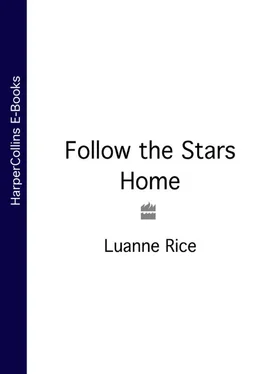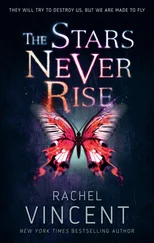1 ...6 7 8 10 11 12 ...22 Julia would sigh. She would gurgle like a baby, and Dianne would talk back in words: “There, honey. Is that better? Let me tell you about the owl and the pussycat.…Ever hear about how monarch butterflies migrate to Belize? …About the otters that live in the marsh and the hawks that hunt along the banks …”
Dianne was no saint. Her anger and frustrations knew no bounds. She banged nails with a vengeance. She’d yell while she sawed, swearing at God, the universe, and the McIntosh boys. Money was tight. She charged huge sums for her playhouses, targeting the richest people possible. But production was limited; she lived rent free with her mother and paid nearly everything she made to insurance and deductibles. When the aides were there, she’d take off on breakneck runs along the beach, rows through the marsh in her father’s old dinghy. Crying and exercise were free.
Her studio was now in the small cottage behind her mother’s house, where she and Julia had come to live after Tim left. The windows overlooked the estuary, the green reeds golden in this twilight hour. Sawdust was everywhere. Like pollen carried on the spring air, it filmed the cottage floor, workbenches, table saw, miter box, and the inside of the windowpanes. Stella, her shy tiger cat, hid in her basket on a high shelf. Julia sat in her chair.
They listened to music. Dianne loved out-of-date love songs that expressed mad longing and forever love; she sang them to Julia while she worked. “The Look of Love,” “Scarborough Fair,” “Going Out of My Head.”
Dianne had been without a man for Julia’s entire life. Sometimes she saw women with husbands and imagined what it would be like. Did they have all the love they needed, was it worth the fighting and disagreements to be part of a secure family? In the dark, Dianne sometimes felt lonely. She’d hug her pillow and imagine someone whispering to her that everything would be okay. She tried not to picture a face or hear any certain voice, but the night before she had imagined how Alan’s back might look under his shirt, how his muscles would strain if he held her really tight.
Measuring carefully, she used a pencil to mark lightly the places she wanted to cut. The table saw let out a high-pitched whine as she guided the wood through. Her father had been a carpenter. He had taught her his craft, and Dianne never cut anything without hearing his gentle voice telling her to mind her priceless hands.
“Home from the wars,” Lucinda Robbins said, walking in.
“Hi, Mom,” Dianne said. “Tough day?”
“No, darling,” said her mother. “It’s just that I can feel my retirement coming in July, and my body is counting the days.”
“How many?” Dianne asked, smiling.
“Eighty-seven,” Lucinda said, going over to kiss Julia. “Hello, sweetheart. Granny’s home.”
Lucinda crouched by Julia’s side. Julia’s great liquid eyes took everything in, roaming from the raw wood to the finished playhouses to the open window before settling on her grandmother’s face.
Dianne stood back, watching. Lucinda was small and thin, with short gray hair and bright clothes: a sharp blue tunic over brick-red pants. Her long necklace of polished agate came from a street market in Mexico, bought on the only cruise she’d ever taken with Dianne’s father, eleven years earlier – the year Julia had been born and he had died.
“Maaa,” Julia said. “Gaaa.”
“She’s saying our names,” Lucinda said. “Ma and Granny.”
“She is?” Dianne asked, dumbstruck by her own need to believe.
“Yes,” Lucinda said soothingly. “Of course she is.”
Julia had hypersensitive skin, and Dianne smoothed her blond hair as gently as she could. Her hair felt silky and fine. It waved just behind the girl’s ears, a white-gold river of softness.
“At Julia’s age, you had the same cornsilk hair,” Lucinda said. “Just as soft and pretty. Now, tell me. What did Alan say?”
“Oh, Mom.” Dianne swallowed hard.
Lucinda touched her heart. “Honey?”
Dianne shook her head. “No, no bad news,” she said. “No news at all, really. Nothing definite one way or the other.”
“Has she grown?”
“An eighth of an inch.”
“Isn’t that a lot?” Lucinda asked, frowning. “In so short a time?
“No!” Dianne said more sharply than she intended. “It isn’t a lot. It’s completely normal, Mom.”
“Good, honey,” Lucinda said, striking what Dianne had come to consider her Buddha pose: straight back, serene eyes, hands folded in prayer position under her chin. She might have the same turmoil inside as Dianne, but she hid it better. “Were you nice to him?” she asked.
“Nice?” Dianne asked.
“To Alan,” her mother said. “When you saw him today …”
“Well …” Dianne said, remembering the look on his face as they’d left his office.
“Dianne?”
“Why does he have to remind me so much of Tim?” she asked.
“Oh, honey,” Lucinda said.
“They move in identical ways,” Dianne said. “Their voices sound the same. Alan’s hair is darker, but it gets light in the summer. He wears glasses, but when he takes them off …”
“Superficial similarities,” Lucinda said.
“I tell myself that,” Dianne said. “I feel so bad, holding this miserable grudge against him. But my stomach hurts every time I think of what Tim did. I lie awake hating him for hurting Julia, but I also hate him for leaving me too. It’s horrible, like I swallowed a rock.”
“Ouch,” Lucinda said kindly.
“I know. And every time I look at Alan, I think of Tim. He makes me think of all the hurt and betrayal, of how much I hate his brother –”
“No,” Lucinda said sharply. “That I don’t believe.”
“I do, Mom. I hate Tim.”
“But I don’t believe Alan makes you feel that way. He can’t. He wouldn’t-he’s too good. He cares for you and Julia, he’s always been there. Those feelings are yours alone. Wherever they come from, you’re taking them on yourself.”
Dianne thought of Alan’s eyes, how kind and gentle they were when he looked at Julia. She pictured his hands examining Julia’s body, holding her crooked hands as if they were the most precious things on earth.
“I know he’s good,” Dianne said quietly.
“Listen to me, honey,” Lucinda said. “When you talk about swallowing that rock, I can see what it’s doing to you. I can. You’re tough as can be, you carry the weight of the world on your shoulders, but those hard feelings are tearing you up.”
The reality of her mother’s words brought tears to Dianne’s eyes. Her stomach clenched, the rock bigger than ever. Once the sorrow over Tim’s departure had gone and the only things left were bitterness and anger and the rock in her stomach, Dianne had realized in a flash that she had made a mistake from the very beginning: She had chosen the wrong brother.
“I’m fine,” Dianne said.
“You say that, but I can see how worried you are. And then when Alan calls, you snap at him – as if it’s him you’re mad at instead of Tim. When he’s just trying to help.”
“Sometimes he gets me at a bad time,” Dianne said.
“With him it’s always a bad time,” Lucinda said.
“I’m tired, Mom,” Dianne said, uncomfortable with the conversation and the way her mother was smiling at her.
“When I retire,” Lucinda said, putting her arm around Dianne, “I’m going to spend some time taking care of you.”
Dianne’s throat ached. It felt so good to be loved. She closed her eyes and let her mother’s strength flow into her. She may have chosen the wrong brother, screwed up her life, but she had the best mother in the world.
“Julia and I have big plans for your retirement,” Dianne said.
Читать дальше












